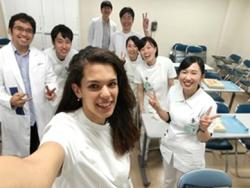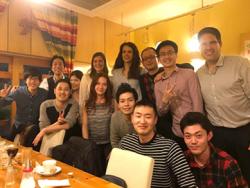国際・国内交流
Dayana Pramatarovaさん(ソフィア医科大学第6学年次)
Study report at Hyogo College of Medicine
My name is Dayana Pramatarova and I am currently a 6th-year student in Medical University of Sofia. Situated in the heart of the capital, my university is the biggest and the oldest institution for higher medical education in Bulgaria. Founded in 1917, it has rich history and still preserves its traditions, but in the meantime follows the modern tendencies. Due to its growing international relations, I had the amazing possibility to spend one month in Hyogo College of Medicine, Japan.
Traveling around the world in order to explore new cultures and to learn from different nations, has always been a true passion of mine. As a future doctor, I am extremely happy to have had the chance to witness Japanese art of medicine.
First, my internship started in the Department of Hepato-biliary-pancreatic surgery, where I spent 2 weeks, and the second part of it was in the Department of Neurosurgery.
Being truly passionate about Surgery and Neurosciences, I had chances to broaden my knowledge and understand more profound how some conditions are being diagnosed and treated. In both departments, I was able to see how Japanese doctors manage to combine both surgery and science and implement it to their everyday practice. What fascinated me the most was the way that they treat every single medical case, analyzing it from every possible aspect.
Every morning their working day starts with conference in English, where they all discuss the previous and the following procedures. I believe that this is one of the most precious things that they taught me – namely their strong organization, respect for one another and unity in the name of the patient’s welfare.
During my stay there, I was able to observe different steps of the healing process – from the diagnosis to the treatment. In the Department of Hepato-biliary-pancreatic surgery, there were several cases of primary or metastatic tumors of the liver, bile duct and pancreas, which I managed to observe in the operation room. It was really interesting to see how surgeons detect tumor borders with the help of the dye Indocyanide green under infrared light or how they perform substomac preserving pancreato-duodectomy with liver lobectomy. Moreover, I even had the chance to scrub in a couple of times and to assist in endoscopic removal of gallbladder. I also improved my practical skills owing to the mini lectures and workshops for students that the doctors organized.
One of the most crucial things that I've learned there is that the postoperative period is equally important as the procedure, and some life-threatening conditions can occur, such as liver dysfunction or postoperative fistulas.
During the second part of my journey, in the Department of Neurosurgery, I got more familiar with some specific neurosurgical procedures, such as cerebral aneurysm treatment. I wouldn’t exaggerate if I say that this department is a true paradise for every neurosurgeon – offering the chance to observe modern microsurgical techniques, various approaches, both open surgical and endovascular therapy.
This was my very first time to see how doctors perform aneurysm clipping or the therapeutic alternative - aneurysm coiling; surgical treatment of carotid stenosis, brain tumor surgery, cranioplasty.
I was really impressed by the navigation system that surgeons use during operation and how precise every manipulation is. I was also lucky enough to witness several times cerebral angiography and emergency endovascular treatment of ischemic stroke. As the professor once said, real magic is happening every day in the operation room.
The high professionalism of Japanese doctors isn't their only quality – they are extremely hospitable and warm people, with great readiness to help and to share their knowledge.
In our free time the doctors and some students from the English club of the college gave me and the other exchange students the possibility to discover some aspects of Japanese culture and cuisine.
Being at the dawn of my medical career, I am truly inspired by their attitudes toward medicine in general and their constant willingness to learn new things. One of the most valuable lessons I’ve learned there, is that theory and practice should always go together in order to achieve success. Doing this internship in Hyogo College of Medicine is doubtlessly one of my best experiences and will definitely influence not only my future career as a doctor, but also my personal qualities and perceptions of my life.
I really hope that someday I will have a chance to come back again, this time as a specialist, and to be able to share my own knowledge and skills. Being extremely grateful for this amazing opportunity that you offered me, I am going back to my country even more motivated and amazed by how far human magic can go. Thank you!

